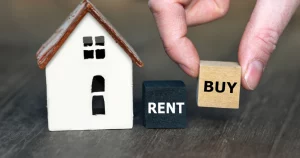The decision to buy or rent a home involves multiple layers of analysis. Financial stability plays a critical role, alongside current market conditions and personal circumstances. Each option presents distinct advantages and drawbacks. Homeownership typically promises long-term investment potential, while renting offers flexibility and reduced initial financial commitment. Understanding these dynamics is essential for informed decision-making when asking: Is it better to buy or rent a home? What factors ultimately tip the scale?
Key Takeaways
- Buying a home typically involves significant upfront costs, while renting requires lower initial expenses and predictable monthly payments.
- Market conditions greatly influence the decision; a buyer’s market may favor purchasing, while a seller’s market often makes renting more appealing.
- Homeownership provides long-term investment benefits, such as property appreciation and tax deductions, unlike renting which lacks equity growth.
- Renting offers greater lifestyle flexibility and mobility, beneficial for those who may relocate frequently or are in transitional life stages.
- Personal circumstances and financial stability, including income and savings, are crucial factors in deciding whether to buy or rent a home.
Understanding the Housing Market: Trends and Impacts
Understanding the housing market is essential for potential buyers and renters alike, since it directly influences the decision-making process regarding home ownership. Market trends, including supply and demand dynamics, can greatly impact the question of whether it is better to buy or rent a home. For instance, in a seller’s market, rising prices may deter buyers, making renting a more attractive option. Conversely, a buyer’s market with lower prices can encourage home purchases, suggesting ownership may yield long-term benefits. Additionally, local economic factors, interest rates, and demographic shifts play critical roles. Therefore, informed individuals must analyze these variables to make educated choices that align with their lifestyle and financial goals, ultimately answering the pivotal question of home ownership.

Financial Considerations: Costs of Buying vs. Renting
When evaluating the financial considerations of home ownership, one must meticulously analyze the costs associated with buying versus renting. Buying a home typically involves a significant upfront investment, including down payments, closing costs, and ongoing expenses such as property taxes and maintenance. In contrast, renting often requires lower initial costs and offers predictable monthly expenses, including rent and utilities. A study indicates that over a five-year period, homebuyers may incur costs averaging 15-20% more than renters, depending on market conditions. However, homeowners benefit from property appreciation, which can offset initial financial burdens over time. Ultimately, the decision of “Is it better to buy or rent a home?” hinges on individual financial situations and long-term goals, requiring a thoughtful cost-benefit analysis.
Lifestyle Flexibility: Pros and Cons of Renting
The decision to buy or rent a home extends beyond financial considerations to encompass lifestyle flexibility, a significant factor for many individuals and families. Renting offers unparalleled mobility, allowing tenants to relocate easily for job opportunities or personal preferences without the burden of selling a property. This adaptability is particularly beneficial for young professionals or those in shifting life stages. However, renting may limit personalization of living spaces, as modifications often require landlord approval. Additionally, long-term renters might face rising rents, impacting financial stability. Conversely, stability in one’s living situation can foster a sense of community and belonging. Ultimately, evaluating lifestyle flexibility is essential when deciding, “Is it better to buy or rent a home?”
Long-Term Investment: Benefits of Homeownership
While renting can provide immediate housing solutions, homeownership emerges as a compelling long-term investment for many individuals and families. Studies indicate that homeownership typically appreciates over time, often outpacing inflation and providing financial security. According to the Federal Housing Finance Agency, home values increased by an average of 4.8% annually over the past decade. Additionally, homeowners benefit from tax deductions on mortgage interest and property taxes, enhancing their overall financial position. Moreover, owning a home fosters a sense of community and belonging, as individuals and families invest in their neighborhoods. For those contemplating “Is it better to buy or rent a home?”, the potential for wealth accumulation and stability through homeownership offers significant advantages that renting cannot match.
Making the Decision: Key Factors to Consider
Making a decision about whether to buy or rent a home involves a careful assessment of various key factors that impact an individual’s financial situation and lifestyle preferences. To begin with, financial stability, including income, savings, and credit score, is essential in determining affordability. Next, market conditions, such as interest rates and property values, can influence the decision. Additionally, personal circumstances, including job security, family size, and long-term goals, play a significant role. The potential for home appreciation versus the flexibility of renting must also be considered. Ultimately, understanding these elements enables individuals to weigh the pros and cons effectively, leading to an informed conclusion on the question: “Is it better to buy or rent a home?”
Frequently Asked Questions
What Are the Tax Implications of Buying Versus Renting a Home?
The tax implications of buying versus renting a home largely favor homeowners, who can often deduct mortgage interest and property taxes, while renters typically lack such benefits, resulting in different financial advantages and responsibilities for each option.
How Do Maintenance Responsibilities Differ Between Owning and Renting?
Maintenance responsibilities markedly differ between owning and renting. Homeowners must manage all repairs and upkeep, while renters typically rely on landlords for maintenance. This distinction influences overall costs, time investment, and personal accountability in housing situations.
Can Renting Lead to Better Financial Stability Than Buying?
Renting can foster better financial stability than buying, as it often entails lower upfront costs, flexibility in relocation, and reduced maintenance expenses, allowing individuals to allocate funds towards savings and investments more effectively.
What Impact Does Location Have on Buying Versus Renting Decisions?
Location greatly influences buying versus renting decisions, as property values, rental prices, and local amenities vary widely. Urban areas often favor renting for flexibility, while suburban locations may encourage purchasing for long-term investment benefits.
How Does Home Equity Build up Compared to Renting?
Home equity builds over time through mortgage payments and property value appreciation, offering financial benefits to homeowners. In contrast, renters do not accumulate equity, resulting in a lack of long-term financial investment and potential security.
Conclusion
To sum up, the decision to buy or rent a home is multifaceted, requiring careful analysis of financial implications, market conditions, and personal circumstances. While purchasing a home can yield long-term investment benefits and potential appreciation, renting offers increased flexibility and reduced upfront costs. Ultimately, individuals must weigh these factors against their lifestyle and financial goals, ensuring that their choice aligns with both immediate needs and future aspirations within the evolving housing market landscape.
You May Also Like To Read:

